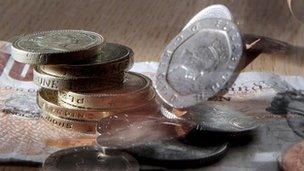Pound continues to weaken against dollar and euro
- Published

Some analysts believe policymakers are happy to see sterling weaken further
Sterling has continued to weaken against the dollar and the euro on continued worries about the health of the UK economy.
Against the dollar, sterling fell to a seven-month low, and against the euro it was nearing a 15-month low.
The falls came after Bank of England policymaker Martin Weale said that sterling may need to weaken further to bolster the UK economy.
Currency speculators are also betting that sterling will fall, data shows.
Sterling fell 0.5% to $1.543, its lowest since 13 July, 2012. The euro was up 0.3% against sterling, making a euro worth 86.3 pence.
The pound has been weakening this year following some disappointing economic data and worries that the UK may lose its triple-A credit rating.
In a speech on Saturday Mr Weale said the currency may need to weaken further, helping to make exports cheaper and boost growth.
Last week, the pound suffered its biggest weekly loss since early June 2012 after a weak retail sales report for January added to worries about the economy.
The pound had already been under pressure since the middle of last week when the Bank of England quarterly inflation report forecast higher inflation and weak growth.
Governor Mervyn King also said the Bank was ready to tolerate higher inflation to support the economy.
Steve Englander, currency strategist at Citi, wrote in a research note: "If you go through recent Bank of England commentary, they are quite openly cheer-leading the pound down as a way of closing the UK's external imbalance and generating a cyclical recovery."
Speculators have increased their bets against the pound, with latest data from the Commodity Futures Trading Commission showing they built up their largest "short" sterling bets since last June. Short sellers make money if a currency or share price goes down.
- Published16 January 2013
- Published15 January 2013